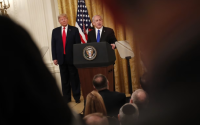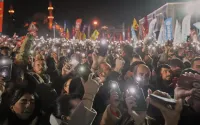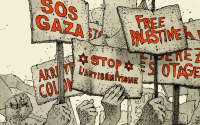Turkey Grows More Worried Every Day About a U.S. Attack on IraqOctober 28, 2002By IAN FISHER
ISTANBUL, Oct. 27 — Barely a day goes by without Turkey's prime minister, Bulent Ecevit, saying just how little he wants a war with his neighbor Iraq. He complains about being "caught in the middle." He bluntly raises Turkey's importance to the United States, on the map and as the only Muslim country in NATO.
"We know that the United States cannot carry out this operation without us," he said last week. "That is why we are advising that it abandon the idea. We're telling Washington that we are worried about the matter."
In the end, there seems little doubt that Turkey, however reluctantly, would side with its big friend and patron. But months into the American drive for support against Iraq, Turkey's leaders are still withholding their wholehearted support, and their discomfort grows daily.
So unanimous are Turks against a war in Iraq that it has hardly been raised in the campaign for parliamentary elections on Nov. 3. The election looks certain to expel the coalition led by Mr. Ecevit in favor of an untried party with roots in political Islam, which worries many here as a threat to Turkey's secularism.
Still, even the leaders of that party, Justice and Development, repeat the same conflicted refrain: Yes, Saddam Hussein is a menace. Turkey, they say, will probably support the United States in the name of its long and broad friendship, as well as its own strategic interests.
But Turkey, concerned that war could worsen an already dire economy and inflict new problems of refugees and Kurdish separatism, is not eager to play the role Pakistan did in the war in Afghanistan.
"It is in the nature of Turks to be convinced easily but react when they realize that they have been cheated," warned Abdullah Gul, a top Justice and Development leader who is in the mix to become Turkey's next prime minister. "Therefore, Turkey should be listened to and understood over her interests and concerns."
So the real issue is not whether Turkey will ultimately go along in an operation against Iraq, say Turkish officials, analysts and diplomats. Rather it is salving the nation's worries to prevent any long-term damage to relations between the United States and Turkey, the kind of moderate Muslim country Washington would like to encourage.
"Both nations will take extreme care not to have an open conflict over what happens in Iraq," said Ilter Turan, a political science professor and a former rector at Istanbul Bilgi University. "But if the United States intervenes and if you have a prolonged struggle, a prolonged military role in Iraq, probably quite a number of problems might crop up."
The election has injected a further note of uncertainty in the form of the Justice and Development Party, which is currently drawing as much as 30 percent in the polls. The question mark is whether its leaders, though they have disavowed political Islam, will be any less of an ally to the United States, particularly on the question of Iraq.
Mr. Gul and Recep Tayyip Erdogan, the party's popular leader, who have played down their pasts as Islamic activists, say the relationship would likely stay the same, and Mr. Gul has been quoted as saying that they would leave any decision on Iraq to Turkey's military. Most experts say they would have no choice, at least in the short term; in 1997, the military eased out the last Islamic-leaning party to govern Turkey.
Zeyno Baran, a fellow with the Center for Strategic and International Studies in Washington, said it was highly unlikely they would change the alliance with the United States. "Absolutely not," she said. "Because this will be the grounds for the military removing them."
With elections a week away, Turkish and American officials are reportedly deep in negotiations about an assault on Iraq and how the United States would safeguard Turkey's concerns. Last week, Gen. Tommy R. Franks, head of the United States Central Command, and Gen. Joseph W. Ralston, supreme allied commander in Europe, visited Turkey for talks with its top commanders. On Wednesday, President Bush called President Ahmet Necdet Sezer for a discussion the White House said covered the "United States-Turkey strategic partnership."
Officials from both nations say there has been no formal request, like a role for Turkish troops in a ground operation in Iraq or the use of air bases here, seen as indispensable for American bombing runs on Iraq. Several reports suggest that any plan might include having Turkey send thousands of troops into northern Iraq — in addition to the 2,000 to 5,000 already there chasing Kurdish rebels — to stem the flow of refugees or defeated Iraqi fighters.
Turkey, though, is decidedly wary, and officials say Washington is frustrated that it has withheld firmer support, partly out of worry that Mr. Hussein will take full advantage of disunity in the region.
But Turkey's own worries stretch back over a decade, to the last time it was asked to help in an attack on Iraq. Turkish officials complain that Operation Desert Storm cost tens of billions in dollars, in military expenses, trade with Iraq and lost revenue from tourism. The no-flight zone enforced since then over northern Iraq also led to what they believe is something close to an independent Kurdish state there, a longstanding worry for Turkey, with its own restive Kurdish population.
Government officials here complain loudly that they do not fully trust American assurances that there will be no actual Kurdish state and have even threatened to take Iraqi territory if Kurds seize the oil city of Kirkuk, which Turkey says is populated mostly by ethnic Turkmen.
But many experts say there is a greater worry about a new war: money. Turkey remains in a deep economic crisis, eased only recently and with pain through a new program with the International Monetary Fund. Many Turks see their real interest not in war with Iraq, but in talks to join the European Union, which this month spurned Turkey once again by not setting a firm date for talks on joining the organization.
If the United States wants Turkey's support, many here say, it must be sure Turkey does not lose again, and reportedly a financial package worth roughly $5 billion is being discussed. Some experts suggest that it would also help if the United States pushed the European Union to set a date for entrance talks at a meeting of ministers of the European Union in December. Iraq may, otherwise, remain a hard sell here.
"The country is already in trouble, and an external crisis is all we need," said Ahmet Atici, 37, who sat reading a book in his empty shoe store at an upscale mall in Ankara, the capital. "We have no customers. We close down with pitiful figures every night. So we should only be concerned about our own national interests."






